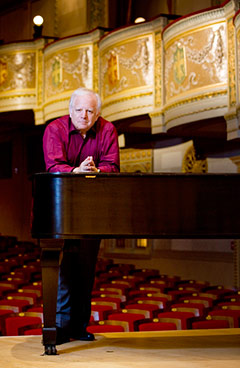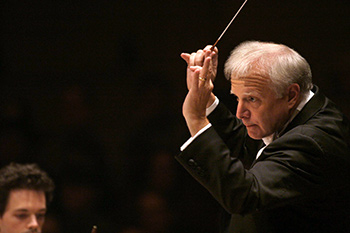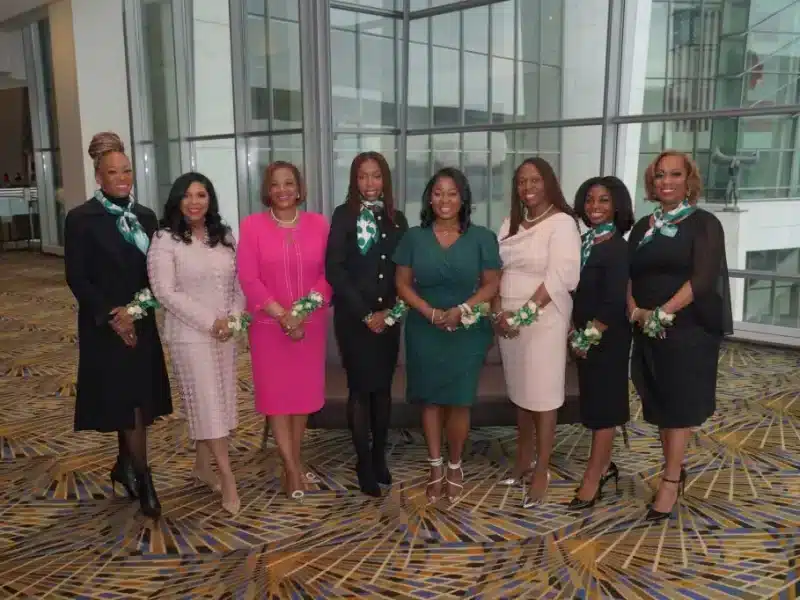Slatkin Goes to Bat for the Detroit Symphony and the City
Incoming DSO music director Leonard Slatkin got the Detroit bug. The Grammy winning maestro’s presence here is good not only for music fans. With his rep for civic involvement, educational outreach and audience-building — not to mention his status as an international figure in the music world — the symphony’s “Slatkin era” also stands to be a boon for the community as a whole.
His face graces billboards all over town. He’s got a boatload of Grammys (seven, and that’s exactly seven more than I have). So what was one of the first things Leonard Slatkin wanted to do after announcing he’d be the Detroit Symphony Orchestra’s new musical director? Throw out the first pitch at a Tigers game.
“A lot of people know that baseball is my passion,” says Slatkin, a L.A. native who comes to lead the DSO after a term as musical director of the National Symphony Orchestra in Washington, D.C. When he asked if maybe he could get the gig at Comerica Park, he was thrilled last spring to actually get to do it. Slatkin also got an unexpected thrill that day, as well.
 “I don’t know, maybe 700 people out of 30,000 people there knew who I was at that point,” he says. After the announcer told the crowd who he was, he threw his pitch and returned to the stands. And then, the baseball fans rolled out the red carpet. “So many people said ‘welcome,’ and ‘what are you doing in the 5th inning in case the pitcher screws up?'”
“I don’t know, maybe 700 people out of 30,000 people there knew who I was at that point,” he says. After the announcer told the crowd who he was, he threw his pitch and returned to the stands. And then, the baseball fans rolled out the red carpet. “So many people said ‘welcome,’ and ‘what are you doing in the 5th inning in case the pitcher screws up?'”
Slatkin was touched. He says he got an overwhelming sensation of being “home” that day. “And I thought I threw a good pitch, too,” he adds.
Anne Parsons, president and executive director of the DSO, says the symphony hit a home run with Slatkin. She says the conductor now has a thing for this fair city. “He got the Detroit bug, and he just can’t wait to get going.”
He finally takes the conductor’s baton officially as music director this week. For a full schedule, check out the DSO web site, and it’s obvious that Detroit music fans are filled with anticipation, too. It’s like that Bugs Bunny scene when Bugs, dressed as a conductor, enters the music hall to excited whispers of “Leopold! Leopold!” Music fans are in awe of Slatkin.
Slatkin is good for not just for the music – although he and Parsons will both tell you that the artistic stuff is the top priority for both the organization and the conductor – but also for the community as a whole.
The whole package
Slatkin has a reputation for building arts organizations that are deeply rooted in the community, too. The onetime director of the St. Louis Symphony, he’s known especially for his educational programs.
Parsons says in that sense the DSO scored. “If we’d met a conductor who was going to be incredible with the community but didn’t have the kind of leadership skills that he has on stage, we couldn’t hire that person,” she says. “But when you meet someone who has the talent for programming, … and understands what makes people feel warm and fuzzy inside when they hear music, and add to that this community interest and appeal, we were just lucky.”
That’s already being felt in the DSO’s programs and schedules. For instance, the children’s matinee concerts this season feature top notch artists like Bela Fleck and Evelyn Glennie, and many are being conducted by Slatkin himself, including one this Saturday and another in January. That’s not a typical move. Kiddie concerts are not every music director’s priority, but Slatkin says it serves a couple of purposes. On one hand, it’s a draw for parents, who ultimately buy the tickets and want to see quality performers, too. And on the other, the quality acts will form good taste and a penchant for music in what will be the DSO’s next generation of audiences. Think of it as a way to make sure that when kids think of great composers, their only frame of reference isn’t an old Bugs Bunny cartoon.
Slatkin references Dizzy Gillespie’s famous remark that there a re only two types of music, good and the other stuff.
re only two types of music, good and the other stuff.
“For me, everything is driven by the artistic goals,” he says. Music is his course for adventure. It’s his passion. It’s his bases loaded in the 9th inning.
Hello, Detroit
That said, he also knows he’s in city that could use a boost. If you were dropped onto this planet last week and knew nothing else of this place called Detroit other than what you read in the national press, you’d think this was the worst place on the planet. Give it to Canada. Turn off the lights. See ya wouldn’t want to be ya.
So what can the guy with the baton do with that?
For one thing, he is an ambassador for Detroit.
“Here I am in Pittsburg. Last week I was in Paris, and then next week I am in Madrid,” he says. In every program for every show, it clearly identifies him as Detroit’s music conductor. And — “as long as I do well,” Slatkin says, that sends a message that wow, Detroit has something else going on. Detroit is not over, by any means.
More locally, he can help remind the region of what the city has to offer by way of its rich arts and culture. Make that world-class arts and culture.
“I think all the changes that have gone on in Dettoit in the last seven years are also very tangible (to Slatkin),” Parsons says. “He sees change, he sees the spirit. He sees the fact that we all get that we’re not just an orchestra sitting in our hall, saying ‘If anybody shows up, great.'”
An arts organization needs to be more connected than that, she says. It has to be relevant. “It’s got to be more integrated into the community. He saw that role we were playing beyond the music.”
And Slatkin can also help inspire donors to keep the music alive. For his part, he says the tough economy doesn’t scare him.
“I’ve kind of been through this war before. I was in St. Louis wh en TWA went under and McDonnell Douglas left. The orchestra was one of those nice bright lights. What I am hoping is that people can go, ‘Ah Detroit, you have that orchestra.’ It’s part of our job to show them why it’s important.”
en TWA went under and McDonnell Douglas left. The orchestra was one of those nice bright lights. What I am hoping is that people can go, ‘Ah Detroit, you have that orchestra.’ It’s part of our job to show them why it’s important.”
Slatkin says he knows orchestral music — or even the jazz, world music and other eclectic fair offered by the DSO — isn’t for everyone, but he hopes people realize the importance of having a first-class orchestral ensemble in this city. “People who go to hear Ludacris aren’t necessarily going to go to Brukner Willie Nelson fans probably won’t go to hear Strauss. But they might. You have to make it available to them.”
The DSO’s music, he says, is often old, but it’s not out of touch. “What we’re playing for the most part has been around for an awful long time, and there’s a reason for that.”
He said he can’t explain exactly what it is about classical music that makes people respond, but it’s there.
As for the city, he hopes to keep the DSO one of those “bright lights” that remind people of what Detroit has to offer.
“What we are doing is to try to make people see how we can at least be a small instrument of change. Showing people what Detroit is, and what it can be once again.
Clare Pfeiffer Ramsey is editor of Model D and often sees the world through Looney Tunes colored glasses. Send feedback here.




